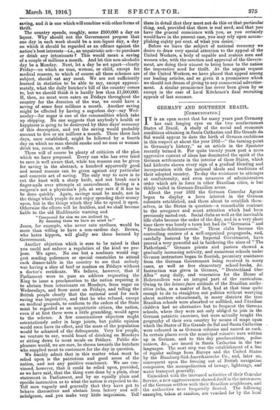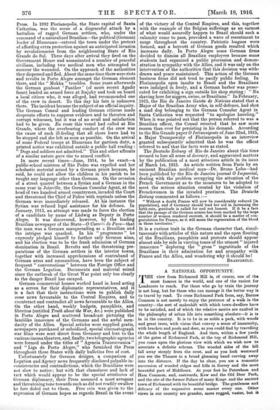GERMANY AND SOUTHERN BRAZIL.
up shipping. No one suggests that anybody's health or TT is an open secret that for many years past Germany happiness is going to be destroyed by three day& economy -11- has cast longing eyes on the two southernmost of this description, and yet the saving would probably States of BraziL A study of the social and economic amount to five- or six millions a month. These three fast conditions obtaining in Santa Catharina and Rio Grande de days, once established, might be followed by a fourth, Sul would. appear to date the birth of German ambitions day on which no man should smoke and no man or woman in this respect at about the year 1892—" the turning-point drink tea, cocoa, or coffee. in Germany's history," as an article in the Spectator to save is well aware that, while ten reasons can be given German settlements in the interior of these States, which for saving in the abstract, a hundred apparently good had hitherto shown every sign of a gradual blending and and sound reasons can be given against any particular incorporation with the national ideals and traditions of and concrete act of saving. The only way to save is to their adopted country. To-day the resistance to attempts cut the knot with a sharp knife, and not break one's at confraternity, and even measures of administrative finger-nails over attempts at unravelment. Saving is a order which are in force in other Brazilian cities, is but surgeon's not a physician's job, at any rate if it has to thinly veiled in German-Brazilian areas.
" Compound for sins we are inclined to, previously meted out. Social clubs as well as the inevitable By damning those we have, no mind to." ' rifle clubs became the order of the day, and in a very short Press. In 1892 Florianopolis, the State capital of Santa Catharine, was the scene of a disgraceful attack by a battalion of ragged German settlers, who, under the command of a naturalized Brazilian—the political (German) leader of Blumenau—entered the town under the pretext of affording extra protection against an anticipated invasion by revolutionaries from the neighbouring State of Rio Grande do Sul. Three days after arrival they fired on the Government House and assassinated a number of peaceful civilians, including two medical men who attempted to succour the wounded. On the approach of the authorities they dispersed and fled. About the same time there were riots and revolts in Porto Alegre amongst the German element there, and the " Mukka " troubles. Some years afterwards the German gunboat ' Panther ' (of more recent Agadir fame) landed an armed force at Itaj uhy and took on board a local citizen who, it was alleged, had recommended one of the crew to desert. To this day his fate is unknown there. The incident became the subject of an official inquiry. The German Consul and leading German citizens made desperate efforts to suppress evidence and to threaten and corrupt witnesses, but it was of no avail and satisfaction had to be given. En route this vessel had called at Rio Grande, where the overbearing conduct of the crew was the cause of such ill-feeling that all shore leave had to be stopped and she left as soon as possible. On the arrival of some Federal troops at Blumenau for garrison duty, a printed notice was exhibited outside a public hall reading : " Dogs and soldiers not admitted." This and other affronts of a similar nature gave rise to armed conflict. In more recent times—June, 1914, to be exact—a public-school mistress of S;Io Pedro was expelled and her scholastic material seized by a German priest because, he said, he could not allow the children in his parish to be taught any language other than German. On the occasion of a street quarrel between a Syrian and a German in the same year in Joinville, the German Consular Agent, at the head of two hundred armed countrymen, invaded the Court and threatened the Chief of Police with reprisals unless the German were immediately released. At his instance the Syrian was refused legal assistance for his defence. In January, 1915, an attempt was made to force the election of a candidate by name of Ludwig as Deputy in Porto Alegre. It was discovered, however, by the leading Brazilian newspaper of the State-0 Correio do Pogo—that the man was a German masquerading as a Brazilian and the intrigue was quashed. In his " programme " he expressly pledged himself to further only German aims, and his election was to be the frank admission of German domination in Brazil. Revolts and the threatening pre- parations of the German settlers in the interior towns, together with increased apprehensions of contraband of German arms and ammunition, have been the subject of frequent " conversations " between the Foreign Office and the German Legation. Documents and material seized since the outbreak of the Great War point only too clearly to the danger Brazil has escaped. German commercial houses worked hand in hand acting as a screen for their diplomatic representatives, and it is a fact that their instructions were to publish daily some news favourable to the Central Empires, and to counteract and contradict all news favourable to the Allies.
On the other hand, weekly budgets, pamphlets, and librettos (entitled Truth about the War, &c.) were published in Porto Alegre and scattered broadcast picturing the lamblike innocence of the Germans and the awful men- dacity of the Allies. Special articles were supplied gratis, newspapers purchased or subsidized, special cinematograph war films were sent direct from Germany and lent to the various cinema theatres, and, finally, two telegraphic agencies were formed under the titles of " Agencia Transoceanica " and " Lige de Porto Alegre," who furnished the Press throughout these States with daily bulletins free of cost.
Unfortunately for German designs, a comparison of Legation and Agency news frequently disclosed palpable in- consistencies and contradictions, which the Brazilians were not slow to notice ; but with that clumsiness and lack of tact which would appear to be the special attributes of German diplomacy, their Press assumed a most arrogant and threatening tone towards such as did not readily swallow he fare doled out to them. Free rein was given to the expression of German hopes as regards Brazil in the event of the victory of the Central Empires, and this, together with the example of the Belgian sufferings as an earnest of what would assuredly happen to Brazil should such a calamity come to pass, provoked a wave of resentment to surge throughout the country. Patriotic leagues were formed, and a boycott of German goods resulted which increases daily. In Porto Alegre some German firms decided to dismiss all Brazilian employees because some students had organized a public procession and demon- stration in sympathy with the Allies, and it was only on the intervention of the authorities that this decision was with- drawn and peace maintained. This action of the German business firms did not tend to pacify public feeling. In Florianopolis open insults to Brazil and the Brazilians were indulged in freely, and a German barber was prose- cuted for exhibiting a sign outside his shop stating : No shaving here for niggers, swine, or Brazilians." ' In February, 1915, the Rio de Janeiro Gazeta de Noticias stated that a Major of the Brazilian Army who, in self-defence, had shot a mad dog belonging to the German Consular Agent in Santa Catharine was requested "to apologize kneeling." When it was pointed out that the person referred to was a Brazilian officer, the Consul retorted that he saw more reason than ever for persisting in his demand. According to the Rio Grande paper 0 Intransigents of June 22nd, 1915, a Major Trompowsky of Florianopolis in an interview granted subsequently admitted that he was the officer referred to and that the facts were as stated.
The Deutsche Zeitung of Rio de Janeiro about this time seemed to lose all sense of decency, and aggravated matters by the publication of a most atrocious article in its issue of March 1st, 1915. An article written from Paris by an eminent Brazilian medical man—Dr. Bruno Lobo—had been published by the Rio de Janeiro journal 0 Impartial, dealing with the problem occupying the attention of the French Government as to the measures to be adopted to meet the serious situation created by the violation of Frenchwomen in the invaded provinces. The Deutsche Zeitung commented as follows :- "Without a doubt France will now be considerably reduced [in population], and if Germany should lend her aid in increasing the birth-rate, gratitude is called for and not lament. If it be a fact that the passage of the German armies has been marked by the large number of women rendered enceinte, it should be a matter of con- gratulation for France, as it will mean the regeneration of the blood in those territories."
It is a curious trait in the German character that, simul- taneously with articles of this nature and the open flouting of the Brazilians, pamphlets and protests should appear almost side by side in varying tones of the utmost " injured innocence " deploring the " gross " ingratitude of the Brazilians in their admiration for and sympathy with France and the Allies, and wondering why it should be !
BRASFORTLU.



































 Previous page
Previous page